European Parliament’s resolution to forge closer ties with Armenia has angered Azerbaijan. Baku (Azerbaijan’s capital) said that the resolution contained “unfounded and biased” rhetoric.
Azerbaijani Foreign Ministry spokesperson Aykhan Hajizada said the resolution served as a “clear example of a recurrent double-standards approach against Azerbaijan.” Asserting that the resolution is supported by multiple entities in the European Parliament influenced by the Armenian lobby, Hajizada declared it part of a “smear campaign” against Baku.
The resolution “condemns” Baku’s “military incursions into the internationally recognized territory of Armenia and contends Azerbaijan threatened the territorial integrity and sovereignty of Armenia.
Meanwhile, Russia is likely to be stuck in a stalemate with Ukraine for the foreseeable future. Its erstwhile allies have ‘dumped’ it like a hot potato. Armenia and Azerbaijan have both abandoned Russia as the main source of their weapons and military platforms and are tapping other reliant defense suppliers.
Azerbaijan is opting for Turkish KAAN or Pakistan-Chinese JF-17 fighter jets over Russian Su-35s or the 5th-generation Su-75 ‘Checkmate’ jets. Armenia has also been gradually opting for Indian and French (a European superpower) weapons to boost its defenses.
Azerbaijan’s fighter jet fleet is predominantly Russian. In the late 2010s, Russia pitched Azerbaijan Su-30SM, Su-35, and MiG-35 fighters, all of which are 4.5-generation fighters.
But now, it isn’t likely that Baku will turn to Moscow for 4++ generation aircraft like the Su-35, and it is doubtful if Azerbaijan will invest in Russia’s fifth-generation Su-57 or Su-75 “Checkmate” jets.
Azerbaijan formally enrolled in Turkey’s TF Kaan fifth-generation fighter program last July, indicating a substantial possibility of acquiring the aircraft. Since the aircraft has already made its maiden flight, a possible acquisition may be on the table.
In late February, unverified reports emerged in the Azerbaijan and Pakistan media, asserting that Azerbaijan had signed an agreement with Pakistan to purchase an unknown number of JF-17C Thunder fighter jets for a sum of $1.6 billion.
The reports revealed that the deal encompassed pilot training and armament acquisition. Rumors have been going on for some time, but Azernews said that the export of JF-17 to Baku would take place after the completion of 62 fighter jets for the Pakistan Air Force by 2024.
The agreement calls for the delivery of eight fighter jets in the first tranche, with an option to acquire an additional eight JF-17s later on. The JF-17 Thunder combat aircraft is jointly developed by the Pakistan Aeronautical Complex and China’s Chengdu Aircraft Industry Corp.
If the report about the JF-17 acquisition is confirmed, Baku will eventually have a fourth-generation aircraft as well as the KAAN fifth-generation aircraft. Additionally, Azerbaijan also has the Bayraktar TB2 and Akinci drones (Turkish word for ‘raider’) acquired from Turkey that would plug the remaining gaps in its arsenal.

The TB2 drones have already proved their mettle against Armenia in the Nogorno-Karabakh conflict. The Bayraktar Akinci is a high-altitude, long-endurance drone that can be armed with weapons. It can fire various missiles, both air-to-air and air-to-ground, and is believed to exceed the capabilities of the TB2 UAV.
One thing that Armenia and Azerbaijan agree – they need to stay away from Russia. However, as Azerbaijan leans towards Turkey (Non-EU), Armenia is moving towards France (EU member). Both France and Turkey, however, are NATO members.
Armenia and Azerbaijan are preparing for further hostilities while holding fragile peace negotiations. The conflict has created two axes – one comprising Azerbaijan, Turkey, and Pakistan and another of Armenia, India, France, and Iran (Baku’s staunch and silent supporter). However, both Armenia and Azerbaijan have one thing in common: they have actively made efforts to wean themselves off their dependence on Russia.
In the latest ignominy, Armenia has asked Russia to move its forces from the Yerevan airport, which the Russian border guards have been protecting since 1992. The presence of Russian border guards at Zvartnots International Airport in Yerevan has been constant for decades and has reflected Armenia’s military and political alliance with Moscow.
Armenian Foreign Minister Ararat Mirzoyan announced that Russian border guards were no longer welcome at Yerevan’s Zvartnots airport, putting to rest any doubts about the estrangement between the two countries.
He insisted that the country now possessed the institutional capacity to independently manage border guard services at the airport, and as such, the posting of Russian guards was a temporary measure to support Armenian independence.
Armenian Security Council Secretary Armen Grigoryan told the media, “Armenia has a clear position on this issue, and it informed Russia in an official letter.”

The move comes amidst serious deterioration in relations between Yerevan and Moscow. Two weeks ago, Armenia suspended its membership in the Russia-led Collective Security Treaty Organization. Armenia accused Russia of failing to ensure Armenia’s security during Azerbaijan’s military assault against Nagorno Karabakh in September 2023. The decision to remove Russian guards pertains specifically to the airport; those stationed at the Turkish and Iranian borders will remain unaffected.
Armenia has traditionally relied on Russia for the majority of its arms purchases spanning decades. However, in the wake of the Ukraine war, Russia failed to provide the country with ordered weapons worth US $400 million and did not return the money that Yerevan had already paid, triggering Armenia’s distrust in Moscow.
To build combat capability and effective deterrence against Azerbaijan, it has defied long-standing norms and turned to France and India as its major arms suppliers. A deal was reportedly signed between the Armenian Defense Ministry and the French defense group Thales for the purchase of three cutting-edge GM-200 radar systems in October 2023.
Later that same year, media reports indicated that France would also arm Armenia with 50 armored personnel carriers to bolster its ground forces. The carriers would provide Armenian armed forces with high-level protection and multi-mission capabilities. At least two dozen vehicles have allegedly been delivered to Yerevan.
Additionally, the three GM-200 radars and the night-vision equipment that the French Macron administration had promised to send to Armenia were reportedly slated for shipment on February 22. While the Armenian authorities have not acknowledged these claims, media watchers believe they may have received the delivery.
France, for one, has become Armenia’s quintessential arms supplier and is seen as dethroning Russia, once Armenia’s biggest exporter. However, it is not the only one.
Other than France, India has tapped into the South Caucasian market to sell arms. Armenia has inked several defense contracts worth at least $400 million with India since September 2022.
- Contact the author at sakshi.tiwari9555 (at) gmail.com
- Follow EurAsian Times on Google News




